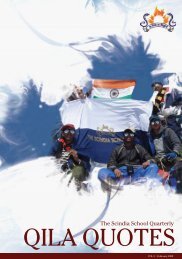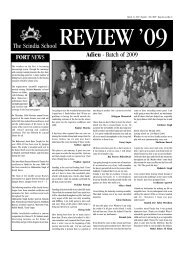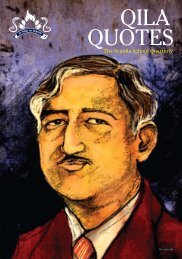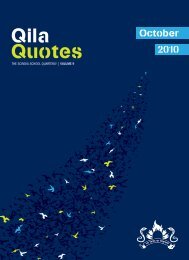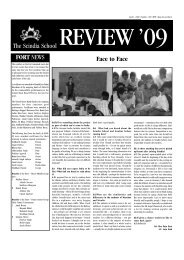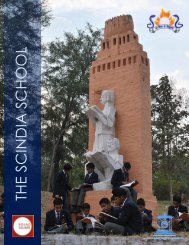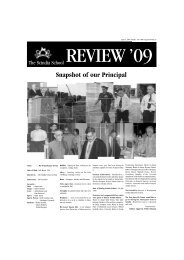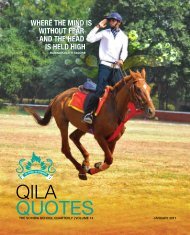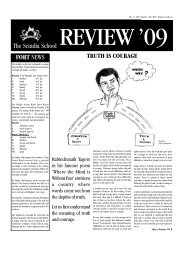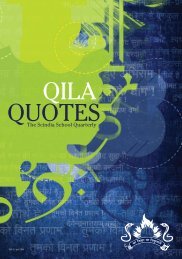24th October 2009 - The Scindia School
24th October 2009 - The Scindia School
24th October 2009 - The Scindia School
- No tags were found...
Create successful ePaper yourself
Turn your PDF publications into a flip-book with our unique Google optimized e-Paper software.
Qila Quotes | Alumni | 10 VOL 5 | Oct <strong>2009</strong>Dare to DreamFor a moment I felt as if I belonged to an endangered species destined for apublic exhibit. “Why don’t you write about yourself?” Former Principal Mr N.K.Tewari asked me on my recent visit to <strong>Scindia</strong>. “I don’t want any reminiscencesabout school. Just a piece about who you are and what you do. Show there’s aworld beyond IITs and IIMs.”How could I, I wondered. Am I at all a model of ‘success’ to be feted as anexample? In my bid to answer these nagging questions, I found myself staringat a blank computer screen – my head flanked by both my palms – andlooking for a clinching argument to convince students to stay away from theoverpowering lure of IITs/IIMs and IT. Is there any? Especially one that hasto be made by a journalist who earns far less compared to the technologyprofessionals in his peer group? <strong>The</strong>re is none really, I concluded, if one wantsto study computers or get into an IIT/IIM. And that is my only argument: Dowhat you want, not what others expect of you. For that is what I did and thatis the only wisdom I have to share.It is essential you pursue what you like, not what others insist you must. Ifyour goal is to get into the IITs and IIMs, then let nobody dissuade you. But onthe other hand if you detest them, it is equally important – in fact more – youthumb your nose at naysayers. For there will be many. More often than notpeople end up on the IIT-IIM route for three main reasons: first, because mostof his peers are headed that way; second, most people he knows, includinghis parents and teachers, want him to head that way; and third, for mintingquick money. His volition doesn’t factor as a reason to be there. Given a choice,some of them would have been linguists, some mime artistes and a possiblefew even felinologists. In all likelihood they would have earned less but inall probability they would have turned out to be happier. Let me reiterate: Dowhatever keeps you happy and at your best.This implies a child in his formative stage must have access to different andpossible ‘career avenues’ to know what suits him best. It is nearly impossiblefor families who have to fight for subsistence to enable that kind of a milieubut there is no excuse for prosperous schools, their parents and teachers notto do the same. That is why students who come to <strong>Scindia</strong> must make themost of the possibilities outside classrooms. And teachers, administrators andparents must ensure there are as many as possible to choose from. <strong>The</strong>y havean important role to play in the cognitive growth of children. It takes a set ofprescient and encouraging parents and teachers to recognise what the childwill do best. If they receive no support from home and school, children arelikely to lose the urge to be what they want and forgo their individuality. I waslucky to have had parents and teachers who encouraged learning outside theclass, whether it was reading books, theatre, debating, working for the Reviewor pursuing photography.Even my love for learning new languages was nurtured at <strong>Scindia</strong>. Mr A.N. Dar,who was the Principal then, took the unusual decision to send an exchangestudent to a non-English speaking country. He picked me to represent <strong>Scindia</strong>at Schule Schloss, Salem in Germany. I couldn’t thank him enough for it eventoday. That probably made me the first <strong>Scindia</strong>n to spend a term in a countrywhere the native tongue was not English. I did learn German in my threeand-a-halfmonth tenure there but unfortunately lost it somewhere alongthe way. Nonetheless, I had learnt delightedly of worlds beyond the Englishlanguage. That pushed me to pick up French and Persian. It even strengthenedmy resolve to rediscover languages I knew: Bengali, Hindi and Assamese.Any language other than English, I strongly maintain, opens up worlds thatremain shrouded under the overpowering dominance of English.That’s how my fascination for Iran developed, something most people findhard to understand. Iran has none of the Silicon Valley’s entrepreneurial glitzthat draws in hordes of youngsters to computers. Can a career be made outof Iran? People often ask me. Frankly, it is a concern for which I thank thempolitely but for which I am not thankful at all. Iran is something that interestsand delights me like no other country. If it leaves you snoring, then so be it.While learning Persian, I realised that what most Indians read about Iran iswritten for the western (read American and British) readers. <strong>The</strong> articles glossover the many nuances of this ancient land and its people. Moreover, there islittle in these dispatches that tells us why Iran is so important for India. Neitheris there any mention of the historical legacy of Indo-Iranian ties. It is to undothis flourishing model of unipolar journalism that I hope to report from Iranfor Indian papers and journals.This is akin to the pressing need there is to tell students of ‘worlds’ beyond IT.Youngsters will know of the worlds beyond a computer if they get to samplesome while at school. And any inchoate interest can only be sustained withbacking from people who matter (parents and teachers). I returned feelingsomewhat reassured from my visit to <strong>Scindia</strong>. I had the chance to meet theonly Class XII student, Tarang Tripathi, studying humanities in a crowd ofscience and commerce students. Propped up by his parents and the school, hewas happy charting his course. In a world of threatening homogeneity, thereis enough space for ‘oddballs’ like him. And it is a solemn responsibility ofoutstanding schools like <strong>Scindia</strong> to ensure they are not entirely extinct and, infact, to attempt to increase their tribe.Debarshi Dasgupta(Ex-Dl 1999) is a correspondent with Outlook magazine in New Delhi. Hehopes to live in and report from Iran one day as part of his larger goal to travelto places where Indian journalism hasn’t.I can assert without the faintest doubt that my tenure at school crafted me theway I am today. My decision to become a journalist was conceptualised andreinforced because of my involvement with the Review. I had to study and playgames while at school. I didn’t have a choice. But, on the other hand, I wantedto edit the Review and I longed to write for it. That was my choice. And therewas joy and contentment in it like none other.



